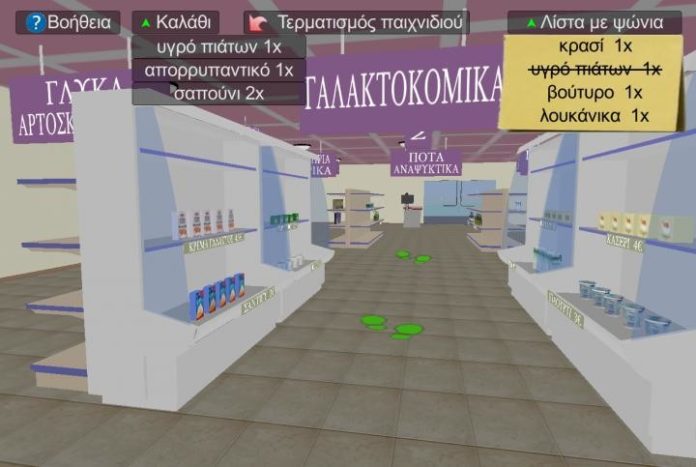
Greek researchers demonstrated the potential of a virtual supermarket cognitive training game as a screening tool for patients with mild cognitive impairment (MCI) among a sample of older adults. MCI is a condition that often predates Alzheimer’s disease (AD) and is characterized by memory loss and inability to execute complex activities such as financial planning.
So far virtual reality game–based applications and especially virtual supermarkets have been used as cognitive training applications and as measures of cognitive functions, although it has been shown that they can detect MCI only when used in combination with standardized neuropsychological tests. However scientists from the Aristotle University of Thessaloniki (AUTH), the Greek Association of Alzheimer’s Disease and Related Disorders (GAADRD) and the Centre for Research and Technology Hellas/Information Technologies Institute (CERTH/ITI) have succeeded in making the shift to MCI screening via robust virtual reality game applications that can be used on their own for accurate MCI detection.
In an article published in the Journal of Alzheimer’s Disease, the researchers have indicated that the virtual supermarket (VSM) application displayed a correct classification rate (CCR) of 87.30%, achieving a level of diagnostic accuracy similar to standardized neuropsychological tests, which are the gold standard for MCI screening. Patients with MCI can live independently and not all such patients progress to AD. Therefore the global effort against cognitive disorders is focused on early detection at the MCI stage.
A large number of older adults use computerized cognitive training exercises/games as an easy and enjoyable means of exercising their brain. If these games and exercises can also detect cognitive disorders, the whole cognitive screening process could become more pleasurable, thus motivating more people to be evaluated. With the majority of older adults examining their cognitive health regularly through such games, possible cognitive impairment will be detected at the MCI stage thus allowing patients to enjoy a better quality of life and remain independent for a longer time.
The use of the VSM as a robust screening test could have profound implications for the diagnosis and treatment of MCI, the most important of which is the possibility for automated remote MCI screening. The performance of older adults playing such a game at home could be monitored and an algorithm embedded in the game could inform them when their performance suggests possible cognitive impairment due to MCI, prompting them to visit an appropriate health service. Such a system would have the ability to screen the majority of older adults effectively, while at the same time minimizing examination costs. As computer applications increasingly become embedded in our work and social life, they could also become part of our preventive healthcare. Research on the use of the VSM for remote assessment is already underway and the results of that study will be published soon.
The VSM has been developed as part of the “Εν-ΝΟΗΣΗΣ” project for the use of new technologies in the screening, diagnosis, treatment and support of patients with MCI. Its development, testing and research application have been undertaken by research organizations that have been heavily involved in the transfer and dissemination of high-quality research knowledge, advanced solution development and leading-edge technologies. The same organizations are currently involved in the development and trialing of other novel technological instruments that respond to a number of clinical and organizational needs in the effort against cognitive disorders.
Story Source:
The above story is based on materials provided by IOS Press BV. Note: Materials may be edited for content and length.
Journal Reference:
- Stelios Zygouris, Dimitrios Giakoumis, Konstantinos Votis, Stefanos Doumpoulakis, Konstantinos Ntovas, Sofia Segkouli, Charalampos Karagiannidis, Dimitrios Tzovaras, and Magda Tsolaki. Can a Virtual Reality Cognitive Training Application Fulfill a Dual Role? Using the Virtual Supermarket Cognitive Training Application as a Screening Tool for Mild Cognitive Impairment. Journal of Alzheimer’s Disease, Volume 44, Issue 4 DOI: 10.3233/JAD-141260
